BY ELSA BAUGHMAN
At a recent Sunday Mass in Crawley, England, where I was vacationing, I heard the priest say something during his homily that I have known and has affected me and many others for a long time. He said it is natural to desire to hear the word of God in our own language.
In his homily, Msgr. Tony Barry, pastor of St. Francis and St. Anthony Church (The Friary) in Crawley, said the last time he had heard the Gospel of that Sunday, the Eighteenth Sunday in Ordinary Time, it was read in French while he was visiting France. “It was not the same as if I would have heard it in English,” he said to the congregation.
Msgr. Barry reflected on Pope Francis’ words on the homily in the Holy Father’s recent Apostolic Exhortation, “Evangelii Gaudium.” Msgr. Barry quoted from paragraph 139: “Christian preaching thus finds in the heart of people and their culture a source of living water, which helps the preacher to know what must be said and how to say it. Just as all of us like to be spoken to in our mother tongue, so too in the faith we like to be spoken to in our “mother culture,” our native language (cf. 2 Macc 7:21, 27), and our heart is better disposed to listen. This language is a kind of music which inspires encouragement, strength and enthusiasm.”
These words made my heart burn because there was a time in my life when I went to Mass but I could understand very little of what was said. That was in 1976 when I came to the United States to attend school at the University of Southern Mississippi.
Going to Mass has always been very important to me but during that time I usually felt that something was missing because I couldn’t understand was what said during the homily and in other parts of the celebration. I continued going to church every Sunday nonetheless and as time passed I could understand better but my desire to be able to attend the liturgy in my native language has never diminish.
The Diocese of Jackson has made a great effort to serve the Spanish-speaking Catholics who have made Mississippi their home. In 1974, Msgr. Michael Flannery, present pastor of Madison St. Francis of Assisi Parish, began to celebrate Mass in Spanish in Rosedale, Cleveland, Aligator, Hill House and Shelby for the few Hispanics migrants living in the Delta.
By Christmas of 1979 a Mass in Spanish began to be celebrated in the Cathedral of St. Peter the Apostle in Jackson every Sunday. That Mass continues to be celebrated every Sunday at 2 p.m.
As the Hispanic population increased in the diocese other communities began celebrating Mass in Spanish. Presently there are 23 parishes and missions celebrating Mass in Spanish and three have bilingual services. Also, to keep the faith alive among those who can’t read English, since 1997 the diocese started publishing a four-page insert in Spanish in Mississippi Catholic which now runs once a month.
The diocesan office of Hispanic Ministry is very active and offers workshops in Liturgy, leadership and a School of Ministry. So, I can say with certainty that our diocese has been doing what Pope Frances preaches in his “Evangelii Gaudium.”
As all practicing Catholics should, finding Mass on Sunday while travelling is challenging but necessary. So, being in England and Ireland with two friends and fellow St. Therese parishioners, Teresa Preuss and Esperanza Velasquez, we starting looking for a church to attend.
Searching on her iPad, Teresa found a church very near the hotel where we were staying in Crawley, a city 28 miles south of London. The church, St. Francis and St. Anthony, was across from a restaurant where we had eaten several times but had not realized it was a Catholic church!
It is a special experience to attend Mass in a different country and it is even more special when we are invited to serve in it. Esperanza was asked to bring the gifts to the altar during the offertory at the 11:30 a.m. Mass.
The church, as in many churches in Europe, has two small chapels inside where people gather before and after Mass to pray and to light candles.
We had a peculiar experience the following Sunday while we were standing outside the Dublin, Ireland, airport looking for a shuttle bus to take us to a hotel. Suddenly, we heard bells ringing. We wondered from where the sound of the bells’ ringing was coming. We walked around the building and there it was, a Catholic church, Our Lady Queen of Heaven – outside the airport! It was just a one-minute walk from the arrivals terminal near the parking garage.
It was 11 a.m. and Mass was just starting. We walked in with suitcases in hand and sat down in the back of the church to worship our Lord, one who is very much in hand when we need comfort and when we need to fulfill our Sunday obligation.
Curious about how their bulletins might look, I found out they are just like many in our diocese, with information about parish life and events. The bulletin of Our Lady Queen of Heaven Church in Dublin, “The Peoples Mass,” includes the Introduction of the Rites and the Liturgy of the World.
We also toured St. Paul’s Cathedral in London, the Anglican cathedral of the Diocese of London; and in Dublin we visited St. Patrick Cathedral, the National Cathedral of the Church of Ireland, a church of the Anglican communion. Its present building dates back to 1220 and was originally the Catholic cathedral.
At all these places of worship I prayed for three specific matters: for peace in the world, for the well being of my family and friends and for all the people of the Diocese of Jackson. There is a saying that when one visits a church for first time prayers for three specific intentions may be offered and God might grant them. I hope God heard my prayers!
Category Archives: Featured
Principals participate in international collaboration
By Laura Grisham
Principals Bridget Martin of Southaven Sacred Heart and Clara Isom of Holly Springs Holy Family schools attended the third International Meeting of Dehonian Educators (IMDE) July 21-25 in Valencia, Spain, on behalf
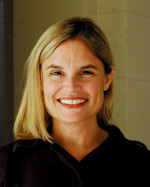
Martin
of International Meeting of Dehonian Educators (SHSM), which supports those schools. ESIC, a multi-campus business school operated by the Spanish Province of the Sacred Heart Brothers and Fathers (SCJ), hosted the weeklong gathering.
Education is a priority of the SCJs , translated from the hopes their founder, Father Leo John Dehon, to have an impact on people and society through education.
The title given to this year’s conference was “Educare: Sint Unum.” The Latin ‘educare’ was used because of their desire to educate the whole person, and ‘sint unum’ to remind the educators that they are all a part of one project.
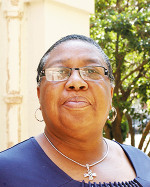
Isom
The IMDE’s objective is to network and collaborate: to get to know one another, to work on the formation of the Dehonian identity as it applies to the schools and to share resources. All of the educators at local, national and international levels spent the week discussing ideas on how to promote the ideas and a Dehonian curriculum to the students, parents and teachers in our schools.
“You gotta know your history,” said Isom. “Education was his (Father Dehon’s) focus. He sent out his people to teach to break the cycle of poverty.”
However, collaborating across continents is not so easy, not to mention the variety of educational institutions from pre-school, middle and high school, to technical schools, seminaries and universities. Each institution, though striving to teach the same charism (any gift that flows through God’s love to humans), has unique ways to accomplish the mission in their respective cultural and institutional setting. Coming together to share strengths and innovations creatively solves many problems. And that was the focus of the gathering—to draw from one another’s strengths and shared identity.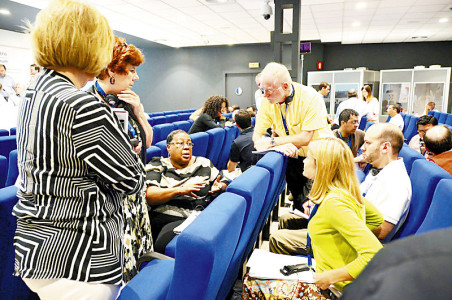
The master plan drawn up to achieve the conference objectives gives a communications hierarchy to educators on a provincial, regional, district and school level. Using technology and the web in particular, all will interact and be able to share in the ideas, projects and events to come. All educators and students will have access to this site.
The principals plan to incorporate more activities at the schools surrounding the Catholic Dehonian ideas and traditions. Each school hopes to effectively be drawn towards the larger common goal.
One way that the US Provincial group suggested coming together was to emphasize feast days for their respective schools — St. Martin, Our Lady of Guadalupe, the Holy Family, the Sacred Heart and St. Joseph. Retreats, in-services, combined school events and a host of other things are in the planning stages.
(Reprinted with permission from “… from the Heart,” the newsletter for SHSM.)
Catechists trained in Call to Protect workshop
By Maureen Smith
MADISON – The diocesan Office for the Protection of Children welcomed Audrey Oliver, a safety analyst from Praesidium, for two workshops in August. Praesidium is the company that produces “Called to Protect,” the program used in schools and parishes in the Diocese of Jackson.
Oliver led workshops in Madison and Tupelo for catechists and parish leaders who will actually be training youth. “We talked about boundaries, how molesters violate them and how teens can protect themselves,” she explained. In these workshops, Oliver goes through the training process, even asking the adults to participate in the activities teens will do during their trainings. Each group gets a sample situation and they have to discuss how they would react. This exercise in Madison inspired a lively group discussion about how the teens might react.
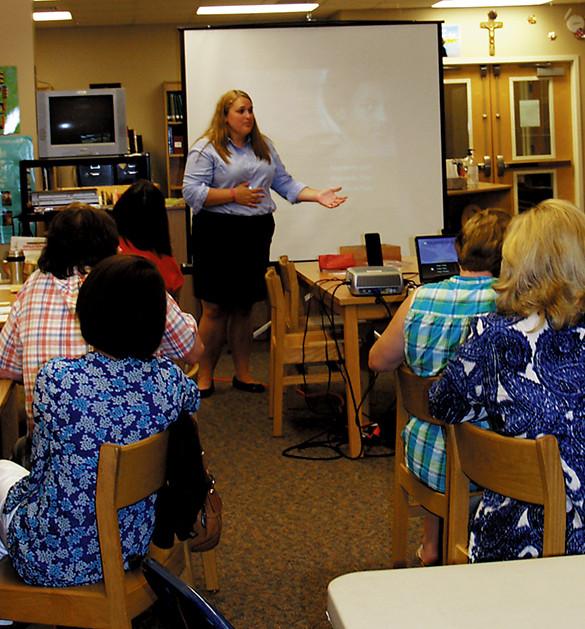
Audrey Oliver, standing, left, trains catechists in “Called to Protect” during a workshop at St. Joseph School. (Photo by Maureen Smith)
Oliver said she often gets feedback to take back to Praesidium from these trainings. “A lot of people said they have to deal with teens who act as if they don’t want to take this training seriously. This material can be hard to talk about, it can be embarrassing. Sometimes this is the first time people are giving them information about sexual abuse,” she said. “What I tell the trainers is that it isn’t just meant to be you teaching. It’s also about having a discussion with youth. It’s about them talking about their feelings and you have to assure them you are available to them,” Oliver added. Trainers have reported that victims of abuse have come forward as a result of the trainings.
In the afternoon sessions Oliver talked specifically about bullying. “I talked about how to recognize bullying as being different than normal teenage conflict and how to monitor high risk areas and activities for bullying,” said Oliver.
“Bullying is intentional, repeated conduct or negative behavior against a youth who has trouble defending himself or herself,” she explained. Teens will have conflicts, but in normal conflict the people involved are on equal footing and they seek some resolution to their conflict. Bullying, said Oliver, is about how the bully feels as a result of the behavior.
Oliver said the participants had lots of discussion during this segment of the training. Her advice for preventing bullying is for teachers and catechists to be present in as many situations as possible, standing in the hall during class changes and even checking bathrooms and hang-out spots to see if teens are bullying. If a situation arises, she suggests separating the parties and trying to find out why the bullying started. The bully may also need help. “Getting to the root of what’s going on is important.” She suggested telling the bully you support him or her as a person, but you cannot support his or her behavior.
Social media has added a whole new term to the discussion, cyberbullying, or using online tools to target an individual. Oliver urges catechists and parents to do their research so they know what apps and social media networks their teenagers are using.
At the end of the day, she said, catechists and teachers can’t control behavior outside their classrooms, but good communication and a good understanding of Catholic teachings will help prevent this kind of bullying.
School library cleanup results in book donation
JACKSON – St. Andrew’s Episcopal School donated more than 1,000 books to Catholic Charities in August. The books will go to the many children’s programs of the agency, including Therapeutic Foster Care, the domestic violence shelter and more.
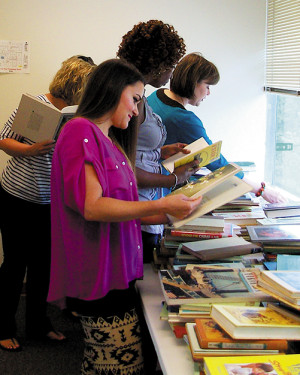
Amy Turner, program director of Therapeutic Foster Care joins fellow therapists Sherrita Harrison, Stacy Pajak, Ann Skelton and Jill Cauthen in selecting books for their clients. (Photo by Michael Thomas)
The donation, according to lower school librarian Laura Ginsberg, was the result of a regular culling of library resources. When books are no longer being checked out, or are a little worn, the library will replace them. The originals are still in good shape, so the librarians started looking for agencies that could make good use of them. When Ginsberg heard about the many children served by Catholic Charities, it seemed like the perfect fit.
Most are children’s books, but some young adult and high school material added. “We had a book fair Aug. 11-14, allowing therapists from all Catholic Charities programs to get books for their consumers,” said Kim Thomason, volunteer coordinator for Catholic Charities. “Our programs were excited for this opportunity to share with their children. We are very appreciative of this generous gift,” she added.
Catholic Charities continues assistance

Louisville – A defiant homeowner in Louisville displays a message of hope May 2, days after a series of deadly tornadoes leveled this block of homes. Catholic Charities continues to help with case management and recovery efforts in all the affected areas. (Photo by Ben Garrott)
Three months after a series of deadly tornadoes caused unbelievable damage to several communities, Catholic Charities’ Disaster Response Teams continue to help manage long-term recovery efforts.
“To date $26,500 has been raised from private donations, diocesean donations and Catholic Charities USA. Currently we are working with local long-term recovery committees in Warren, Winston, Lowndes, Itawamba and Lee County. We are also partnering with Volunteer Organizations Active in Disaster (VOAD), the Mississippi Emergency Management Agency, and the Federal Emergency Management Agency,” explained Chamon Williams, a program specialist with Catholic Charities.
Catholic Charities’ Disaster Preparedness and Response program provides assistance with unmet needs by partnering with committees to ensure that families get proper case management and all available resources are exhausted while looking to see that there is not a duplication of services.
On April 28, more than a dozen tornadoes touched down affecting multiple counties within the Diocese of Jackson. “Catholic Charities, Inc. Disaster Preparedness & Response program are ‘early responders,’ which means we enter to provide disaster relief 72 hours after the disaster. Teams conducted damage assessments in Itawamba, Lee, Rankin and Winston counties in coordination with the Warren County EMA. The Knights of Columbus assisted with managing debris removal and volunteers,” said Williams.
“The Disaster Preparedness and Response team would like to extend a special ‘thank you’ to all who prayed, donated and volunteered. We would not have the ability to provide disaster assistance without you,” Williams said.
It is not too late for those affected by the storms to seek assistance, contact the team at 601-850-9532. Donations are also still welcomed.
Historic documents receive climate control
By Mary Woodward
JACKSON – The diocesan archives is getting a new climate control system to assist in maintaining the historical documents and artifacts it houses. The vault where the archives has been stored since Bishop Richard Gerow brought the historical records from Natchez to Jackson in the late 1940s is located on the ground floor of the diocesan chancery

William Johnson of Upchurch pulls wire as part of the installation process for the Archives’ new climate system. (Photo by Mary Woodward)
office in Downtown Jackson. The vault has never had its own climate system and depended upon the overall building system to keep it regulated.
Archives should be kept at a constant temperature and dryness. The ideal for archive preservation, according to Forrest Galey of the Mississippi State Department of Archives and History, is a constant temperature of 60 degrees and 40 percent humidity.
“The most important condition for archive preservation is providing a stable environment,” Galey said. “Humidity is the enemy of paper and other artifacts. Mold will grow very quickly on paper in a humid environment,” she added.
A new HVAC system based on zones was installed in the chancery office building by Upchurch Services Company. Due to structural and mechanical issues, the archives was not able to be zoned. Therefore, a smaller system, which cools and dehumidifies was added in the vault itself. Moisture is drained into a front flower bed. The entire archives had to be covered to protect it from the dust created by drilling through 10 inches of concrete.

William Johnson (left) and Jeffery Williams of Upchurch Services install the new inverter and drain for the diocesan archives’ climate control system. (Photo by Mary Woodward)
Now the system will be monitored in order to maintain a constant and stable environment for diocesan historical and sacramental records. The diocesan archives holds original documents dating to the 1790s when the Spanish governed Natchez and its surroundings. These sacramental records written in Spanish and signed by early pioneer clergy from Ireland are maintained in the vault along with microfilm records of all the parishes from the beginnings of the diocese.
Parishes keep the actual registers on site, but the diocese microfilms these books every 10 years for long term records management. Because of TV shows such as “Who Do You Think You Are?,” the archives has seen a growing interest in genaeolgical research.
The diocesan archives retains a professional researcher to assist those seeking their ancestors through these records. Dr. William Ashley Vaughan is available to trace family histories back to the late 18th century. These requests must be submitted in writing and are processed as they come. Dr. Vaughan charges a fee for his time.
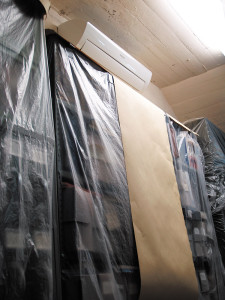
The new dehumidifier/cooling equipment sits above a section of the diocesan archives. The entire archives was covered while the equipment was installed. (Photo by Mary Woodward)
Because the archives functions mainly as records retention for the church, the archives is open only to researchers working on doctoral dissertations, masters theses and various historical projects. Our biggest research topics are for the church in the Civil War and the Civil Rights Movement. From this one is able to see the broad spectrum of materials in the archives.
We recently hosted a young man from the National University of Ireland in Galway who was writing his dissertation on antebellum Irish immigration in the dioceses of Charleston and New Orleans. He spent three days pouring over original documents and correspondence from Bishop William Henry Elder’s papers.
Again, all research requests must be submitted in writing with a basic outline of materials sought. It often takes several months to complete requests.
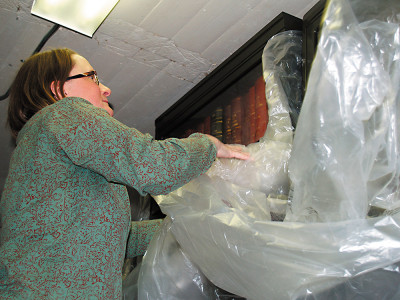
Diocesan director of archives, Mary Woodward, removes plastic sheeting used to cover the archives during the installation of a new climate control system. (Photo by Contyna McNealy)
If you are seeking your own sacramental records or more recent ones, please contact the parish where you were baptized or married. It is much easier for them to get you a copy than for us to do that. Due to privacy issues and identity theft please be prepared to provide identification in order to receive records.
For genaeology or for historical research send all requests to: Diocesan Archives, P.O. Box 2248, Jackson, MS 39225-2248; or email to chancery@jacksondiocese.org. Requests should include contact information with telephone, mailing address, and email.
March for Life dedicated to Our Lady of Guadalupe
By Charlotte A. Koestler
JACKSON – Catholic Charities’ Pro-Life Working Group has dedicated the diocesan high school students’ annual pilgrimage to the national March for Life to Our Lady of Guadalupe, Protectress of the Unborn, and in doing so simultaneously thanks her for sending her son, Bishop Kopacz, to the Jackson Diocese.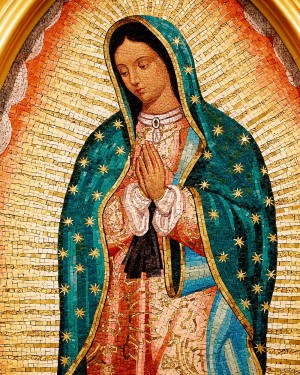
“It seems as if Our Lady of Guadalupe graciously reached out to our diocese as Bishop Kopacz was appointed to serve us on her feast day, December 12,” stated Barbara Mustain, working group member. Bishop Kopacz’s deep devotion to the Blessed Mother under the title of Our Lady of Guadalupe is prominently displayed as a red rose on his coat of arms. The red rose the symbol for the pro-life movement represents all stages of human development from conception until its fulfillment in eternity.
Blessed Mother’s miraculous image produced on Juan Diego’s tilma is abounding in symbolism. The bow on her dress and its high placement and the strategically placed four petal flower, indicate that the virgin is with child making Our Lady of Guadalupe the picture-perfect icon of the pro-life movement. It is interesting to note that Bishop Kopacz selected the Latin phrase Fiat Lux, or “Let there be light,” for his motto since the word, LUZ, Spanish for light, is seen in her garment.
“By this dedication, we are doubly blessed to be under the protection of our mother’s mantle and our bishop’s shield,” said Mustain.
The Catholic Charities Jackson Pro-Life Working Group organizes the annual diocesan high school pilgrimage to the national March for Life. All diocesan high school seniors and juniors are encouraged to go to jacksonmarchforlife.org to learn more about their participation in the 2015 pilgrimage.(Charlotte A. Koestler is a program specialist for parish based ministries for Catholic Charities)
Local Muslims share Ramadan meal
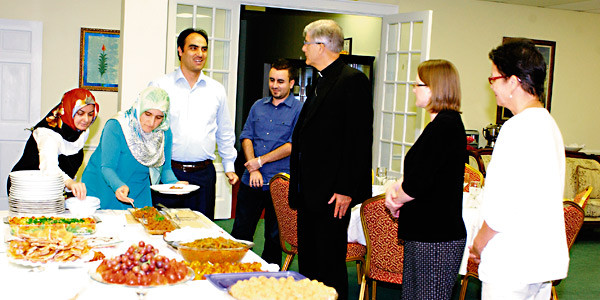
RIDGELAND – Songul Arslan (l-r), Yasemin Gok, Mahmut Gok and Sezai Cankirli, all of the Rain Drop Turkish House and Community invite Bishop Joseph Kopacz and diocesan chancery staffers, Mary Woodward and Fabvienen Taylor, to join in “breaking the fast” for Ramadan on Monday, July 21, at the community’s center. The month of Ramadan requires Muslims to fast from sunrise to sunset. After sundown neighbors traditionally share food and fellowship with one another. Muslim fasting means no food or drink may be consumed at all and is a form of prayer in action by purifying one’s self through self-control. (Photo by Maureen Smith)
Educators prepare for new academic term
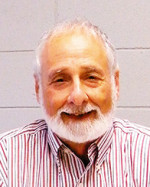
Michel
By Maureen Smith
JACKSON – Some familiar faces will be taking on new roles at three diocesan elementary schools when the new year starts the second week of August. Vicksburg Catholic, Meridian St. Patrick and Madison St. Anthony schools all have new administrators this year. Jules Michel, an education veteran in the Diocese of Jackson, will take on the role as principal in Vicksburg for one year. Julie Bordelon, formerly principal at St. Patrick will be principal at St. Anthony for a year while Jennifer David, formerly a teacher at Columbus Annunciation will become the principal at St. Patrick.
Michel retired in 2012 and Bordelon resigned this year. Both were available and agreed to serve a one year term to provide the school communities in Vicksburg and Madison the time to conduct a proper search for a long-term administrator.
“The process of finding the right administrator is not one we take lightly,” said Catherine Cook, superintendent of schools for the diocese. In order to find a new permanent administrator, each school community will form a search committee that will include the school’s pastor or canonical administrator and representatives from parish and school communities including members of the school advisory council. This committee will obtain information from the school stakeholders relative to the unique needs of the school and the qualities desired for a new principal. The committee will help determine a strategy for advertising the opening.
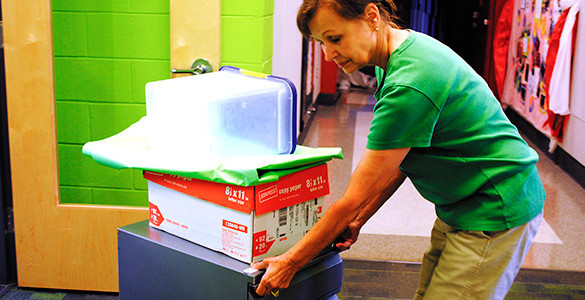
Norma Thiel moves materials to her new kindergarten classroom at Jackson St. Richard School. (Photo by Margaret Anzelmo)
Once applicants are approved by the superintendent, the committee reviews applications, conducts interviews and recommends the candidate that best fits the needs of the individual school.
Michel has attended or been an administrator in three of the four high schools in the diocese. He graduated from Madison St. Joseph School, was principal at Greenville St. Joseph High school and was the administrator of Natchez Cathedral School. His last assignment in the diocese was as principal of Jackson St. Richard School.
Michel holds a bachelor’s degree from Mississippi State University, a master’s in school administration from Delta State and has done post graduate work at the University of Tennessee and Spring Hill College.
He started teaching in 1969. During his time in Natchez he was part of the team that built new additions to the school and began a development office. Under his administration at St. Richard the school underwent a $3 million dollar renovation of the facilities. He served for eight years as the National Catholic Educational Association (NCEA) region V representative for secondary education and was part of the national principals’ retreat team. He was president of the Mississippi chapter for Supervision and Curriculum Development.
Michel also served as chairman of the Southern Association of Colleges and Schools (SACS) Mississippi secondary committee and national representative for Non Public schools in the accrediting agency. He has served on numerous educational and evaluation committees.
Bordelon holds a bachelor’s of science in elementary education and a master’s in educational leadership from Mississippi State University and has been in education since 1986. She has worked in Tampa and Meridian teaching kindergarten and sixth grade until becoming principal of St. Patrick in 2000. While she was principal she led the first annual appeal for the school, which generated
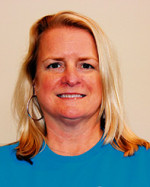
Bordelon
$151,000. She also helped with a $1.4 million capital campaign to build a new facility and started the first trust fund for the school. Bordelon started a development office and helped launch a marketing campaign for the school resulting in an 80 percent increase in enrollment. She is a member of NCEA and the Association for Supervision and Curriculum development.
The advisory council at St. Anthony hosted a meet and greet event for Bordelon Sunday, July 13, at the school. Families crowded the school’s reception area to get a chance to welcome their new principal.
David received her bachelor’s from the Mississippi University for Women and her master’s in education from Marymount University in Arlington, Va. She attended St. Mary School, now known as Columbus Annunciation, and started teaching first grade there in 1996. She went on to teach fifth and sixth grade as well as becoming the assistant principal. She helped establish the middle school at Annunciation and taught math and science to sixth-eighth graders.
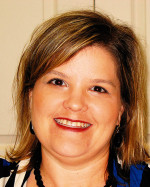
David
“I am so excited to be the new principal at St. Patrick Catholic School, a school well-known in the community for high academic standards and Christian values. Like St. Patrick’s students, I was fortunate to get my start in Catholic schools, giving me a solid foundation for life,” said David. “I cannot wait to meet each and every member of our St. Patrick school family in the coming weeks. Together, we are going to have a great year,” she added.
Father Frank Cosgrove, pastor for the Catholic community of Meridian said he and the community are very excited to welcome David.
“She went to Catholic school herself, and that’s important. She also got her graduate degree from a Catholic university,” said Father Cosgrove. He said he and the search committee were very pleased when they found her.
“We really believe she will help St. Patrick continue to provide the highest academic standards rooted in a deep Catholic identity. We always say St. Patrick is not just a ‘private’ school, it’s a Catholic school, and that is very important to us,” he added.
(Editor’s note: find related back to school content in the bishop’s column on pages 3 and 11 and on page 14)
Soldier’s children’s book opens minds, builds peace
By Maureen Smith
An unlikely children’s author took on an international peace project with help from an art community in north Mississippi. Major Shawn T. Robinson, USMC, is serving as a military advisor in Afghanistan. In addition to being a soldier, he is a Catholic and a father. He is studying for his confirmation and his reflection on his life as a Christian, his work in Afghanistan and his family life led him to write a book for children called “Shoulder to Shoulder.” 
“Shoulder to Shoulder is basically an expression of the love we are supposed to have for our fellow man. The other thing that we are called to be as Catholics is brave. How many times does Jesus tell us not to be afraid?” wrote Robinson in an email from Afghanistan. The book follows the lives of two families, one Afghan, one American.
“I had the idea that I would write a book to my daughter explaining to her why Dad had to go to Afghanistan and it occurred to me that there was a father in Afghanistan that was having the same personal experience that I was,” explained Robinson in a story for the American Forces Network (AFN). The book follows the fathers and their sons as they tell the stories of meeting one another, becoming friends and seeking peace while deployed far from their homes.
For illustrations, Robinson turned to his mother, Diane Dryja, a member of Hernando Holy Spirit Parish. Dryja is involved in an artists’ group.
“I felt very honored when Shawn first approached me with the project. Then I felt overwhelmed because I knew there was no way I could do it on my own in a timely fashion. That is when I decided that I would approach my art teacher, Bernadette Grantham, and my art class for help with the project. They were absolutely wonderful,” said Dryja.
The book is trilingual, with text in English, Dari and Pashto. Dryja said her group wanted to make sure the pictures would also appeal to all audiences. “We knew it would be important to research and learn about uniforms, clothing, family life and customs. We also wanted the pictures to be able to tell the story,” she explained.
The group wanted to be sure the pictures were consistent despite the many hands working on them and keep the story moving.
“So we did our research and went page by page planning what might work. We then divided the pictures up depending on who was interested and able to commit the time painting each particular scene. Many of the pictures had a main artist and another artist did the background. Shawn actually came up with the idea of having the night sky unify the book – the idea being that we all live on the same planet under the same vast sky,” said Dryja.
One of Robinson’s good friends, also an American soldier, died in Afghanistan in 2008. He admitted the loss left him with some bitter feelings about the country, but that all changed during his current deployment. Robinson said the people of Afghanistan “changed my heart.” He wants others to be open to changing their attitudes about people different from themselves.
“I think a lot of people in the United States are afraid to talk about, or associate with Muslims, especially if they are from Afghanistan.

Illustrations from “Shoulder to Shoulder,” a children’s book written by a Catholic soldier serving in Afghanistan. (Photo courtesy of the author, Maj. Shawn Robinson)
I don’t want my daughter to fear other cultures. I want her to learn about other beliefs and make educated, informed decisions. I hope that Shoulder to Shoulder brings a human face to Afghanistan,” he said.
“There are a lot of lies being told about Americans and Christians in general by the Taliban and other terrorist organizations. I hope that Afghan children and parents pick up this book and feel the love. If we are doing our job as a church then we should be a beacon of light that people are drawn to. I want this book to be a part of that light. I want this book to directly combat the Taliban’s message because it is just as important to me that Afghan children want to learn about our culture and our beliefs,” continued Robinson.
Robinson hopes to spread a message of inclusion both in Afghanistan and back at home. “We are not going to change the world by just talking to other Christians. Maybe you have a Muslim coworker that you rarely talk to, or maybe there is an Afghan-American child in your neighborhood that doesn’t have any friends because they are Muslim. That is just not right. Open up, talk to that person and eventually without you doing anything they will see the light inside you,” he urged in his email.
“Shoulder to Shoulder” has a Facebook page; an internet search for Maj. Shawn Robinson will bring up the story done by AFN about the book itself.
(Editor’s note: the day of publication, Major Robinson returned safely from his deployment.)
